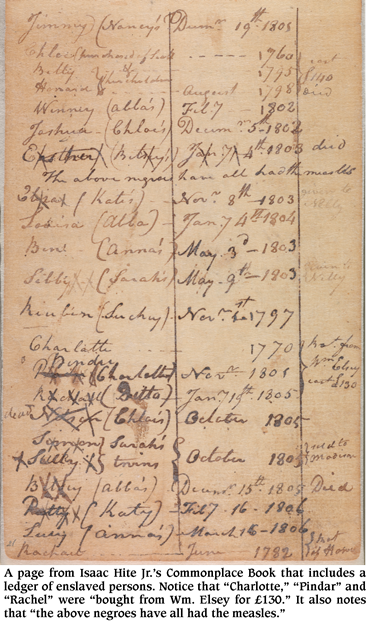Searching for Information
 Sources of information on the enslaved at Belle Grove include family letters, census and tax records, and estate inventories. In addition, Isaac Hite Jr.’s personal records (two “Commonplace Books”) include a ledger of enslaved persons. This ledger includes only the first name of the enslaved. It also lists the first name of each one’s mother, if known (usually because she was also owned by the family), and each one’s date of birth. The slaves no longer owned by the Hites were noted by a mark through their name or comment in the far right column. This list has allowed us to construct family trees of the slaves that were related. It also underscores that the enslaved were considered to be property. Learn more about the Commonplace Book and Belle Grove researcher's analysis of it.
Sources of information on the enslaved at Belle Grove include family letters, census and tax records, and estate inventories. In addition, Isaac Hite Jr.’s personal records (two “Commonplace Books”) include a ledger of enslaved persons. This ledger includes only the first name of the enslaved. It also lists the first name of each one’s mother, if known (usually because she was also owned by the family), and each one’s date of birth. The slaves no longer owned by the Hites were noted by a mark through their name or comment in the far right column. This list has allowed us to construct family trees of the slaves that were related. It also underscores that the enslaved were considered to be property. Learn more about the Commonplace Book and Belle Grove researcher's analysis of it.
We are seeking additional records to learn more about the lives of the enslaved at Belle Grove. Family letters give us limited insight on the work the enslaved did in agriculture and as blacksmiths, cooks, and wagon drivers. The lower level of the Manor House is where the enslaved workforce conducted many of the domestic tasks for the household.
We also want to know more about what happened to the enslaved at Belle Grove. One challenge in doing this research is that the Hites’ records, as was typical of enslavers, only listed the enslaved by first name. We do not know where many of them were at the time of emancipation. After emancipation, did those formerly enslaved at Belle Grove select the last name of a former owner? Or, like many, did they take the opportunity to start their future with another name?
Some of the individuals enslaved at Belle Grove were given to the Hites' children when they became adults or were sold. This adds a further challenge to the research. However, we have found one hopeful story of the Jackson family who purchasd their freedom.
If you think we may have information that would help you locate an ancestor or if you have information that would aid Belle Grove's staff, consultants, and volunteers in our research, please contact us at 540-869-2-2028 or by email. If you wish to support further work in this area, thank you for considering a tax-deductible donation.
Read more about how archaeology is assisting research on the enslaved.
